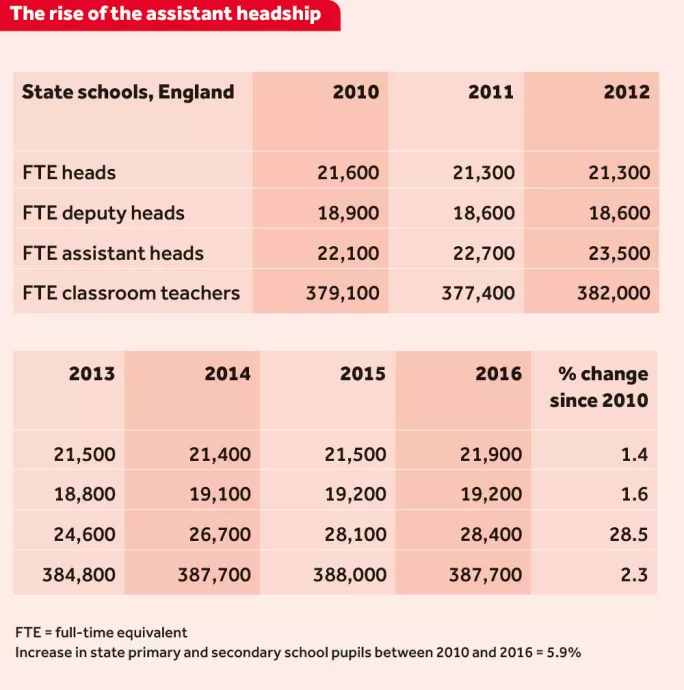Too many generals, not enough troops?

School leadership in England used to follow a familiar model: one headteacher supported by at most a couple of deputies. But in the past six years, a quiet revolution has taken place: the rise of the assistant head.
A Tes analysis has uncovered an explosion in the number of assistant heads since 2010.
Headteacher unions say their proliferation reflects a welcome focus on school-improvement work, and a sensible policy of retaining talented teachers by giving them a leg-up into leadership. But critics argue that surplus assistant heads generate unnecessary workload for classroom teachers and contribute to expensive, bloated senior leadership teams (see page 14).
According to the school workforce survey, 22,100 full-time equivalent (FTE) assistant heads were working in English state-funded schools in 2010. But by 2016, their number had mushroomed to 28,400 - a 28.5 per cent rise.
In comparison, the number of FTE heads increased by 1.4 per cent; deputy heads by 1.6 per cent; and classroom teachers by 2.3 per cent. The number of pupils in state-funded primary and secondary schools, meanwhile, increased by 5.9 per cent.
Most commentators believe that the disproportionate growth in the number of assistant heads over the past few years is a reflection of a recruitment and retention crisis, with schools offering leadership roles as a means of attracting and keeping talent.

As well as conferring extra status and responsibility, an assistant headship will usually involve a pay rise, as the individual transfers into the “leadership group” salary range.
“Part of it is probably just using the system to give pay rises, essentially as a way of recruitment and retention,” says John Blake, head of education and social reform at the thinktank Policy Exchange.
For teachers working in England and Wales outside of London, the maximum salary on the “upper” pay range is £38,633. The minimum salary on the leadership range, meanwhile, is £39,374, stretching to a maximum of £109,366.
The NAHT heads’ union, which says it has seen an increase in the number of assistant heads applying to be members, agrees the role is being used as a recruitment tool.
“We struggle to retain teachers in this country, so giving staff more responsibility and rewarding them appropriately is a sensible way of motivating and retaining talented people,” says the union’s general secretary, Paul Whiteman. He thinks the increase in the number of assistant heads is “a very good thing”, as “more teachers are taking on official responsibility for critical school improvement work”.
Geoff Barton, general secretary of the Association of School and College Leaders, agrees that it is a positive development. He argues that the trend is a sign that heads are taking succession planning seriously.
“Assistant headship is where senior school and college leaders give the first opportunity for middle leaders to learn their craft,” he says. “These figures may well demonstrate how we are developing the future generation of headteachers.”
‘Initiativitus’ is spreading
Blake, however, has serious reservations about the proliferation of the assistant headship role - a job he once held himself.
Far from providing foot soldiers for much-needed improvement work, he argues that the explosion in the number of assistant heads reflects an unhealthy culture of “initiativitus”: schools feel compelled to continuously launch new initiatives, with each project requiring a senior leader to sponsor it.

The risk is that the creation of new assistant head roles, each leading their own improvement programme, generates unnecessary workload for both the individual and their colleagues, he explains.
“A head clearly cannot say to a brand new shiny assistant head, ‘I’m literally only giving you this for retention purposes, please do not do additional work.’
“And almost all work that the SLT does has an impact on the workload of other staff in the school.”
Blake argues that the ballooning number of assistant headships is symptomatic of a fundamental “lack of clarity about what we expect from senior leadership in schools”.
Rather than encouraging every teacher to chase positions on the SLT, he thinks schools need to properly value heads of department and other middle leaders.
“There are clearly generalised leadership positions that must be carried out in a school and are extremely valuable,” he says.
“But that doesn’t mean that that’s the only valuable thing, and nor does it mean that everyone should be encouraged to move into that space.”
Blake also thinks that handing out leadership positions is a “very problematic way” for schools to retain teachers: “It’s not what they are there for - there are other systems in place that exist for that and they should be used.”
There are also financial implications for a school employing more assistant heads.
Blake points out that when someone is given a leadership post, it not only results in an immediate pay rise, but also a recurrent increasing cost as the individual climbs the new pay scale.
“You are baking in those costs for the long term,” he says.
However, Whiteman thinks that Blake is wrong about assistant headships offering poor-value retention. “When staff leave, schools have to go through costly and time-consuming recruitment exercises,” he says.
“Promoting from within shows good business acumen from school leaders and is much better value for money than dealing with the consequences when staff leave because there’s no career progression available to them.”
You need a Tes subscription to read this article
Subscribe now to read this article and get other subscriber-only content:
- Unlimited access to all Tes magazine content
- Exclusive subscriber-only stories
- Award-winning email newsletters
Already a subscriber? Log in
You need a subscription to read this article
Subscribe now to read this article and get other subscriber-only content, including:
- Unlimited access to all Tes magazine content
- Exclusive subscriber-only stories
- Award-winning email newsletters